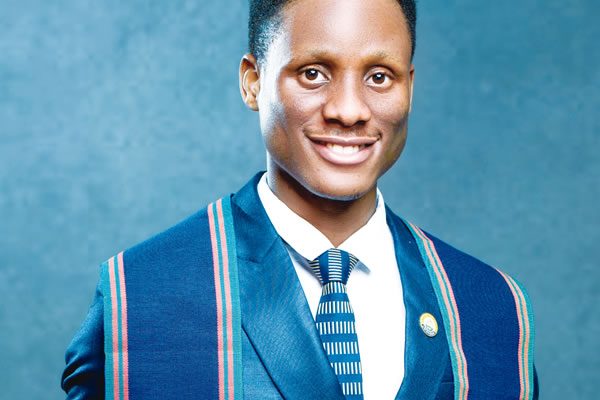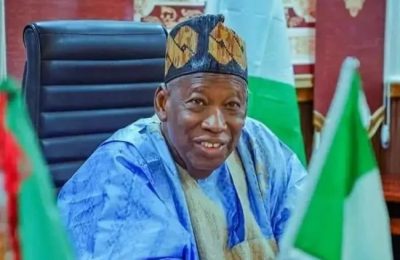
Temiloluwa Oloye graduated from the Department of Electrical and Electronic Engineering, University of Ibadan (UI), for the 2022–2023 session, with a Cumulative Grade Point Average (CGPA) of 3.63 on a scale of 4.00. He was among the UI student team that represented Nigeria at the 2023–2024 Huawei ICT Competition global final held in China on May 26, winning the grand prize in the Cloud Track category. In this interview by Kingsley Alumona, he speaks about his academic journey, the Huawei ICT Competition, among other issues.
What or who inspired you to study engineering, and why did you choose to study it at the University of Ibadan?

Deciding what to study was challenging. As the top student in my secondary school, many advised me to study medicine. However, I disliked some aspects associated with it, and I was not particularly good with biology. During my final year in secondary school, I spoke with relatives, family, and friends who provided career guidance, many of which included engineering fields. Engineering appealed to me due to my love for mathematics and physics. Practical lab sessions in physics, where I easily created electrical circuits from circuit diagrams, solidified my decision to study electrical engineering.
Choosing the University of Ibadan was natural. It is Nigeria’s first and best university with a reputable Faculty of Technology. I wanted to be part of that esteemed system and benefit from its wealth of knowledge and experience.
Practical aspects of engineering teaching and research in Nigerian tertiary institutions are generally poor. What was the practical and fieldwork experience in UI’s Electrical and Electronic Engineering Department like during your studies there?
While many Nigerian tertiary institutions face challenges in providing practical and fieldwork experiences, UI made significant efforts to bridge this gap. We had access to well-equipped laboratories in the Electrical and Electronic Engineering Department, where we could apply theoretical knowledge. The department encouraged internships and industrial training programmes at companies that prioritise hands-on learning. These opportunities provided real-world experience and practical application of our studies. For my final year project, I had access to the necessary tools and mentorship, which greatly enhanced my learning experience.
Which electrical/electronic course was your best and why?
My favorite course was Signal Processing. This course fascinated me due to its profound impact on modern technologies like telecommunications, audio and video processing, and medical imaging. Signal Processing algorithms, similar to machine learning algorithms, involve transforming, analysing, and manipulating data to extract meaningful information. The ability to apply these principles to real-world challenges solidified my interest in this area.
To make a First Class in engineering is not easy. How did you manage to achieve this feat? Any template you could recommend?
Achieving a first-class degree in engineering required discipline, dedication, effective time management, and a genuine passion for learning. Upon admission, I set a goal to graduate with a first-class degree. I was fortunate to have older siblings who had achieved this feat, providing me with inspiration. Starting strong, I achieved a perfect 4.00 GPA in my first semester, which made maintaining a First Class easier.
My approach involved setting clear goals each semester, maintaining a consistent study schedule, revising lecture notes frequently, and practising past test and exam questions. Seeking help from lecturers or peers whenever I encountered difficulties was also crucial.
What was the title of your final-year project and what were the major findings from it?
My final-year project was titled ‘Design and Construction of a TinyML-Based System of Handwritten Digits Recognition for Aiding the Visually Impaired’.
The project developed a compact, low-power machine learning system capable of recognising handwritten digits, which could be converted into audible outputs to assist visually impaired individuals. Major findings include the high accuracy of the Tiny Machine Learning model with limited computational resources and the potential for such systems to be implemented in affordable, portable devices that can significantly improve the quality of life for visually impaired users.
What major academic and infrastructural challenges in UI made your studentship less memorable, and how do you think the school management could help in this regard?
While my experience at UI was largely positive, there were challenges. Frequent power outages, especially during examinations, were significant. Also, overcrowded lecture halls in my first year made it difficult to fully engage with the material being taught in foundational science courses with many students.
The school management can address these issues by investing in reliable power backup systems. Building larger lecture theatres and improving lecture hall facilities would enhance the learning environment.
You were among the UI team that represented Nigeria at the 2023–2024 Huawei ICT Competition global final held in China on May 26. Tell us about the competition and how you made it to the team.
The Huawei ICT Competition is the largest offline ICT competition globally, held annually by Huawei. It brings together students from around the world to compete in various technological tracks, aiming to develop students’ ICT skills and foster innovation. This year’s edition attracted around 170,000 students from over 2,000 universities worldwide, spanning about than 80 countries.
The journey began with the preliminaries and national final stage, where I competed against students from other Nigerian universities. Support from my instructor and peers, Lukman Abdulyekeen and Sodiq Babawale (who later became my teammates), was instrumental in my preparation. Through hard work and dedication, I secured a spot on the national team, earning the opportunity to compete in the Southern Africa regional final and subsequently, the global final.
Your team from UI won the grand prize in the Cloud Track category of the Huawei ICT Competition. Tell us what Cloud Track is about and what your team did differently to win the prize.
The Cloud Track category focuses on information technologies, including cloud services and cloud computing technologies, big data, and artificial intelligence (AI). We were trained on technologies in these fields and applied our knowledge in solving real-life scenario-based problems. Our team’s success was due to a combination of deep technical knowledge and effective teamwork. We worked seamlessly together, leveraging each member’s strengths and knowledge.
What skills and lessons did you learn from the Huawei ICT Competition, and how have they so far shaped your life and career?
Participating in the Huawei ICT Competition was an invaluable experience that significantly honed my technical skills, particularly in big data. I gained expertise in implementing various big data solutions, including offline batch processing, stream processing, real-time retrieval, graph database query, and converged data warehousing, utilising various cutting-edge technologies. I earned a certification as a Huawei Certified ICT professional big data developer.
The competition provided a global perspective on the ICT industry, highlighting the importance of continuous learning in this fast-evolving field. I also learned valuable lessons in teamwork and time management under pressure. I am now more confident in tackling complex challenges and working in collaborative environments. I am incredibly grateful to Huawei for providing this opportunity.
You were recently inducted into the engineering profession. With the induction, what is next for you now as an engineer and where do you see yourself in five years?
In the immediate future, I plan to gain more practical experience by working with leading technology firms. I am particularly interested in roles that involve research and development, as well as the application of emerging technologies like big data and AI.
In five years, I see myself pursuing a postgraduate degree in Electrical and Computer Engineering to deepen my expertise or possibly becoming a leading engineer in a prominent tech company. My goal is to contribute to innovative projects that have a meaningful impact on society, particularly in areas that improve accessibility and quality of life.
There are many electrical, electronics, and electrical/electronics engineers in Nigeria, yet we find it difficult to produce meaningful and sustainable electronic products in the country. How can you advise your fellow electrical/electronics engineers and the government on this?
To produce meaningful and sustainable electronic products in Nigeria, both the government and the private sector should invest more in research and development. This will foster innovation and the creation of new products. Engineers should focus on continuous professional development and innovation, leveraging modern technologies to create solutions tailored to local needs. The government, on its part, should provide incentives for tech startups and improve infrastructure to support local manufacturing and development.
With the uncertain economic realities and high unemployment rate in the country, are you scared of what the future holds for you? Which extra skills do you possess to navigate the demanding labour market?
While the current economic situation and high unemployment rate in Nigeria are concerning, I remain optimistic about the future. Apart from my technical skills in electrical and electronic engineering, I have developed strong analytical, problem-solving, and teamwork abilities. My proficiency in programming languages and knowledge of big data and AI gives me an edge in the tech industry. Continuous learning is also key. I am committed to keeping my skills updated through online courses and certifications. Networking and professional relationships are equally important, as they can open doors to new opportunities.
What is your advice to students who are aspiring to achieve the kind of academic feat you achieved?
My advice to students aiming for top academic honours is to develop a strong foundation in their chosen field early on. Consistent effort and a genuine interest in your studies are key. It’s essential to stay organised and manage your time effectively — create a study schedule and stick to it. Take advantage of all resources available to you, such as online courses.
Don’t be afraid to ask questions and seek guidance from your lecturers and mentors. Believe in yourself, and cultivate resilience and a positive mindset. Actively seek opportunities of interest in your field. Challenges and setbacks are part of the learning process. Stay motivated and keep dreaming big.
ALSO READ: Japa: Trump promises US green card to foreign graduates







